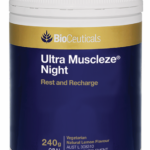Product Description
Bioceuticals Iodine Drops 50ml.
Iodine is important for the normal healthy function of the thyroid gland. Adequate iodine status is required for a normal healthy foetal development.
- Iodine is required for normal healthy thyroid gland function and the synthesis of thyroid hormones.
- Adequate levels of iodine are important to support a healthy pregnancy and for the normal development of the brain and central nervous system in utero through to early childhood.
- Suitable for those who may require additional iodine, including school-aged children, healthy adults, the elderly, and those with impaired absorption.
- Pleasant-tasting, vanilla-flavored liquid allows for easy and flexible dosing.
Iodine is used in the body for synthesis of thyroid hormones (T3 and T4) which influence:[1]
- protein synthesis and growth
- enzymatic processes
- metabolism
- thermogensis
- ovulation and fertility
- myelination of the developing central nervous system.
The iodine content of most foods is low and is affected by agricultural factors such as soil quality and climate. Most iodine is found in the oceans. Coastal soils have higher soil concentrations than inland soils. Marine animals concentrate iodine from seawater and have a higher content than most other foods. Seaweed, which is commonly consumed in Asian cultures, also contains a high concentration of iodine. Processed foods may add to dietary iodine due to the addition of iodate to salt.
Iodine deficiency in Australia
In 2007, the World Health Organisation (WHO) reviewed the scope and impact of iodine deficiency on an international level as part of an overall program aimed at eliminating iodine deficiency.[3] They concluded that iodine deficiency is a significant international health-related concern, and is also one of the most manageable nutritional deficiencies to address.[3,4]
On a more local scale, Food Standards Australia New Zealand (FSANZ) conducted a study to assess the average dietary intake of the Australian population. This survey revealed that most adults are consuming less than the estimated average requirement (EAR), and no section of the population is close to the upper level (UL) of intake.[5]



 LivOn lypo-spheric Vitamin C
LivOn lypo-spheric Vitamin C
 Bioceuticals Ultra Muscleze Night 240g
Bioceuticals Ultra Muscleze Night 240g
 Iodine Forte
Iodine Forte
Reviews
There are no reviews yet.